Japan–Russia relations
 |
|
|
Japan |
Russia |
|---|---|
Relations between Russia and Japan (Russian: Российско-японские отношения, Rossiysko-yaponskiye otnosheniya; Japanese: 日露関係史) are a continuation of Japan–Soviet Union relations covering 1917-1991, and Empire of Japan–Russian Empire relations, covering 1855-1917. The two countries have been unable to sign a peace treaty after World War II due to the Kuril Islands dispute. As of 2016 matters remain unresolved, and these disputes have effectively soured relations between the two countries. According to a 2012 Pew Global Attitudes Project survey, 72% of Japanese people view Russia unfavorably, compared with 22% who viewed it favorably, making Japan the country with the most anti-Russian sentiment surveyed. Since 2017, relations between Russia and Japan have improved.
The government of Boris Yeltsin took power in Russia in late 1991 upon the dissolution of the Soviet Union. At once, Moscow took a stand in opposition to relinquishing the disputed territories to Japan. Although Japan joined with the Group of Seven industrialized nations in contributing some technical and financial assistance to Russia, relations between Tokyo and Moscow remained poor. In September 1992, Russian president Boris Yeltsin postponed a scheduled visit to Japan. The visit took place on October 11, 1993. He made no further concessions on the Kuril Islands dispute over the four Kuril Islands (northeast of Hokkaido), a considerable obstacle to Japanese-Russian relations, but did agree to abide by the 1956 Soviet pledge to return two areas (Shikotan and the Habomai Islands) to Japan. Yeltsin also apologized repeatedly for Soviet mistreatment of Japanese prisoners of war after World War II. In March 1994, then Japanese minister of foreign affairs Hata Tsutomu visited Moscow and met with Russian minister of foreign affairs Andrei Kozyrev and other senior officials. The two sides agreed to seek a resolution over the persistent Kuril Islands dispute, but the decision of the dispute is not expected in the near future. Despite the territorial dispute, Hata offered some financial support to Russian market-oriented economic reforms. On July 30, 1998, the newly elected Japanese prime minister Keizō Obuchi had focused on major issues: signing a peace treaty with Russia, and renewing the Japanese economy. However, he died soon afterwards.
...
Wikipedia
